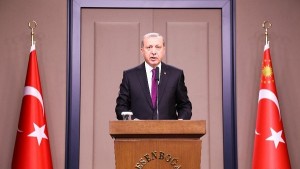Turkey has accused several of its enemies of carrying out the suicide bombing on Wednesday in Ankara that killed at least 28 people. Prime Minister Ahmet Davutoglu blames the attack on the Kurdish militia in Syria, Turkey’s own outlawed Kurdish rebel group, and the Syrian government. Here is a look at Turkey’s friends and foes in the Syria conflict:
KURDISTAN WORKER’S PARTY, or PKK
Based in Turkey, this group has been engaged in a bitter three-decade fight for Kurdish autonomy in southeast Turkey. More broadly, it is also fighting for an independent state of Kurdistan that would comprise southern Turkey and northern regions of Iraq and Syria. The conflict, which has claimed more than 40,000 lives, flared up in July. The PKK is considered a terrorist organization by Turkey, the European Union and the United States.
PEOPLE’S PROTECTION UNITS, or YPG
Based in Syria, it is the Kurdish-dominated armed wing of the Syrian Democratic Union Party. It was formed in 2004 as a militia to combat Syrian government forces, and Turkey accuses it of being affiliated with the PKK. After the war in Syria started, the YPG largely concentrated its efforts on fighting the Islamic State group, leading to charges from Turkey that it is allied with Syrian government. The YPG dominates a U.S.-backed military alliance made up of Kurdish, Arab and Christian fighters known as the Syria Democratic Forces which is now the main fighting force against IS. The YPG has emerged as one of the more effective militias fighting in Syria, raising concerns in Turkey that it might pose a long-term threat to its territory.
THE PESHMERGA
Based in northern Iraq, it serves as the military of the autonomous Kurdistan region. It has received substantial backing from the United States, Germany and other Western countries in its fight against the Islamic State group in Iraq. Turkey, a NATO member, has enjoyed close economic ties with the autonomous Kurdistan region but is nevertheless suspicious of the Peshmerga links to Kurdish groups in Turkey and Syria.
ISLAMIC STATE GROUP
The most prominent Islamic extremist group fighting in Syria and Iraq. Ankara alleges that IS has carried out attacks inside Turkey, and the Turkish military has bombed IS positions. However, the Kurds, Syria and Russia claim the Turkish government has allowed IS militants to move freely in Turkey as a counterweight against the Syrian Kurds.
SYRIAN GOVERNMENT
Ties between Ankara and Damascus — marked by a personal friendship between Turkish President Recep Tayyip Erdogan and Syrian President Bashar Assad — soured following Syria’s anti-opposition crackdown in 2011. Lately, Turkey has also directed its ire at Russia after Moscow began providing military support to the Syrian government. However, as a NATO member, Ankara has given its allies — including the United States — permission to use the Incirlik Air Base to strike IS, which is fighting the Syrian government.
AHRAR AL-SHAM
An ultraconservative group in Syria that enjoys the support of Turkey in its fight against the Assad government. Ankara considers it an acceptable Islamist force compared to IS. The group’s supply lines across the Turkish-Syrian border would be threatened if the YPG manages to establish contiguous territory along the frontier.
Story by the Associated Press
 CGTN America
CGTN America Turkish President Recep Tayyip Erdogan speaks during a press conference before departing for Beijing from Ankara Esenboga Airport, Turkey, July 28, 2015 (Xinhua)
Turkish President Recep Tayyip Erdogan speaks during a press conference before departing for Beijing from Ankara Esenboga Airport, Turkey, July 28, 2015 (Xinhua)
